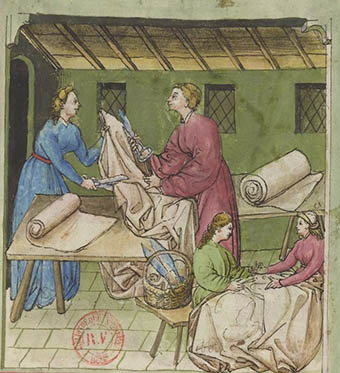 Byzantine workshops usually operated their own retail establishments. Men and women worked together in them. Most shops would hold around 10 people.
Byzantine workshops usually operated their own retail establishments. Men and women worked together in them. Most shops would hold around 10 people.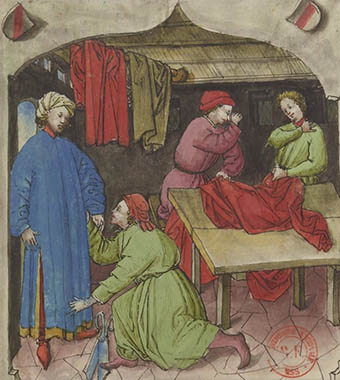 Many workshops were family operations with several generations working under the same roof. Family workers were unregulated. More men were weavers than women, but weaving was a occupation that was totally open to women. Some weavers worked privately and sold their work to wholesalers. This work was done in standard sizes and resold in bundles for the domestic and international markets in various grades and colors. Wholesalers bought it door-to-door by agents, in public places - like the streets and forums - or in special cloth markets.
Many workshops were family operations with several generations working under the same roof. Family workers were unregulated. More men were weavers than women, but weaving was a occupation that was totally open to women. Some weavers worked privately and sold their work to wholesalers. This work was done in standard sizes and resold in bundles for the domestic and international markets in various grades and colors. Wholesalers bought it door-to-door by agents, in public places - like the streets and forums - or in special cloth markets.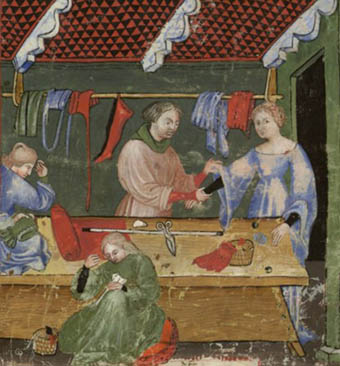 Clothing could be made in specialized workshops or at home in informal family operations. The Imperial workshops were not able to supply all of the needs of the government and the authorities bought ready-made clothing on the open market from private producers. Clothing was made in many types of fabrics like wool, linen and silk and combinations of fibers. Domestic consumption was the primary focus of makers of clothes in Constantinople, requiring tens of thousands of new clothes every year.
Clothing could be made in specialized workshops or at home in informal family operations. The Imperial workshops were not able to supply all of the needs of the government and the authorities bought ready-made clothing on the open market from private producers. Clothing was made in many types of fabrics like wool, linen and silk and combinations of fibers. Domestic consumption was the primary focus of makers of clothes in Constantinople, requiring tens of thousands of new clothes every year.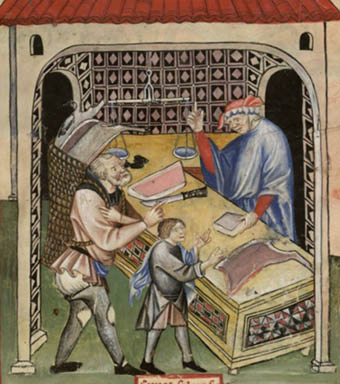 Wholesale buyers of ready-made clothes not only sold to consumers in Constantinople, they also retailed them in local fairs and markets, Like the great fair of Thessalonica were most of the trade was in clothes. In the 12th century this trade expanded rapidly and was spread by a big increase in maritime shipping between ports in Greece and the Aegean Sea. This was one reason for the expansion of silk weavers to places like Thebes and the Morea.
Wholesale buyers of ready-made clothes not only sold to consumers in Constantinople, they also retailed them in local fairs and markets, Like the great fair of Thessalonica were most of the trade was in clothes. In the 12th century this trade expanded rapidly and was spread by a big increase in maritime shipping between ports in Greece and the Aegean Sea. This was one reason for the expansion of silk weavers to places like Thebes and the Morea.
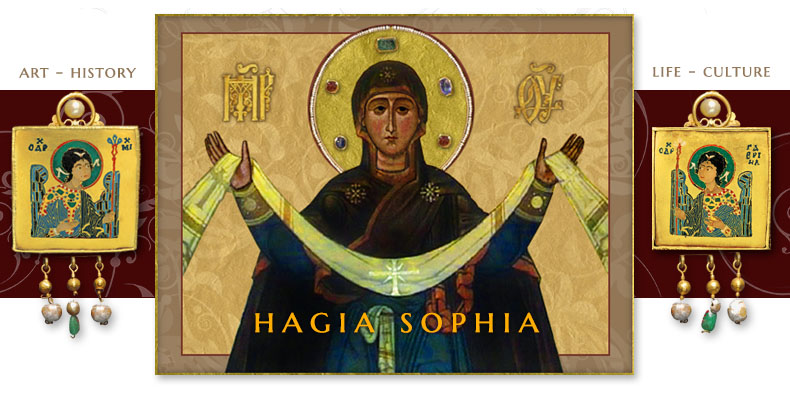
Regulation of the Silk Industry - From the Book of the Eparch
Merchants of Silk Stuffs
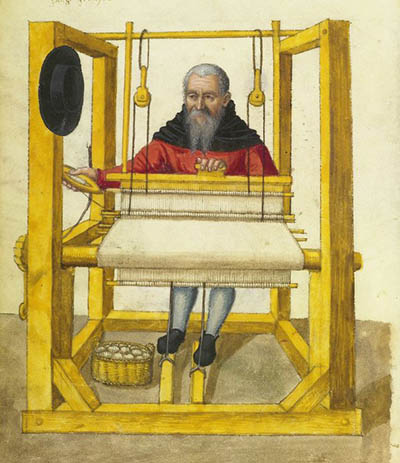 The silk merchants will be concerned with the purchase of silk garments. They ill not engage in any other purchases except those articles they require for personal use, and they are forbidden to sell the later. They are moreover forbidden to resell to persons who are "strangers" to the city the articles which are on the prohibited list, that is say purple of the of the distinctive dyes (red or violet), so as to prevent exportation of these out of the Empire. Offenders will be flogged and liable to confiscation.
The silk merchants will be concerned with the purchase of silk garments. They ill not engage in any other purchases except those articles they require for personal use, and they are forbidden to sell the later. They are moreover forbidden to resell to persons who are "strangers" to the city the articles which are on the prohibited list, that is say purple of the of the distinctive dyes (red or violet), so as to prevent exportation of these out of the Empire. Offenders will be flogged and liable to confiscation.
Silk merchants whether freeman or slaves who purchase from the nobility or silk buyers, or from anyone else, garments exceeding ten nomismata in value shall declare the same to the eparch so that he may know where these articles are to be sold. Offenders will suffer the above-named punishments.
Anyone else who has not declared to the eparch the peach-colored or red garments or mantles of two-thirds dye will be punished.
Any person who fails to inform the eparch of the sale of an article destined for aliens of the Empire, so that the eparch may certify the transaction, shall be held responsible.
To obtain admittance to the guild of silk merchants five members of the craft must testify to the eparch that the candidate is a person worthy to exercise the craft. He shall then be admitted to it, he shall open a shop, and carry on a business. His entrance fee to the guild is 6 nomismata.
To obtain a license to acquire the workshop of a silk merchant the tax is ten nomismata. The recommendation of the eparch is required.
Every person exercising at one and same time the craft of silk merchant and silk dyer shall be put to election to chose one or other of these crafts to the exclusion of the other. Anyone attempting to carry on both crafts shall be liable to the aforesaid punishments.
Care must be taken to ensure that strangers who lodge in caravanserais do not purchase prohibited or unsewn garnets, unless for personal use; and in the latter case the articles must have been manufactured in Constantinople.
When strangers leave the city their departure must be notified to the eparch so that he may take cognizance of the articles they have purchased.
Anyone helping them to evade this obligation shall be flogged, shaved and have his property confiscated.
Every silk merchant who secretly or opening causes the rent of any other silk merchant to be raised, shall be flogged, shaved and be liable to confiscation.
Raw Silk Merchants
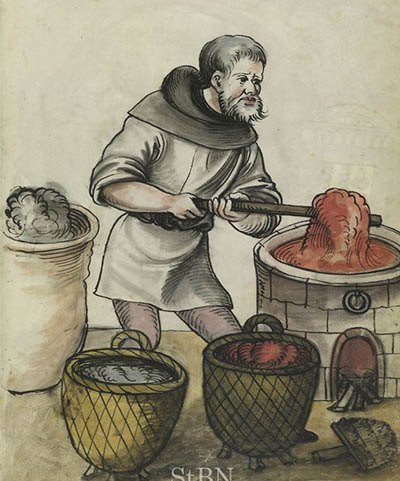 Merchants in this class are limited to exercising their own trade, and must do so publicly in public places which are assigned to them. Anyone contravening this law shall be flogged, shaved and banished.
Merchants in this class are limited to exercising their own trade, and must do so publicly in public places which are assigned to them. Anyone contravening this law shall be flogged, shaved and banished.
Every raw silk merchant who employs a workman for wages must only engage him for one month. He shall not advance him more than a month;s salary, that is to say the amount he can earn in 30 days, and whoever pays in excess of that sum shall forfeit the excess.
A raw silk merchant is forbidden to engage an employee of another member of his craft until such employee has worked for the latter for the full period for which he was engaged. Any contravention is to be punished by the forfeit of tht part of the salary which he the emplyee has received without having worked for it.
For each cantar of raw silk the raw silk merchant shall pay to the exarchs of the guild one keration. All those craftsmen whose scales or weights do not bear the sealed impress of the eparch shall be flogged and shaved.
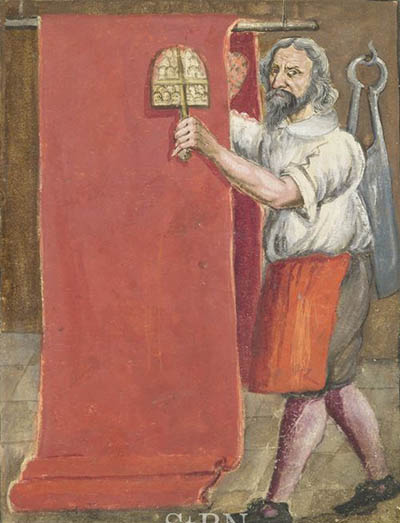 Individuals who have to come to lodge with raw silk in the caravanserias have no fee to pay for selling it. They shall only pay their rent and the right of sojourn. Nor shall those who buy raw silk be required to pay any fee.
Individuals who have to come to lodge with raw silk in the caravanserias have no fee to pay for selling it. They shall only pay their rent and the right of sojourn. Nor shall those who buy raw silk be required to pay any fee.
At the opening of the market all of the members of the guild shall contribute according to their means to fund to prchase the raw silk which shall then be rationed among them in proportion to their respective contributions.
If a rich raw silk merchant wishes to sell to one of his poorer brethren raw silk acquired from some importer, the profit he will secure will not exceed on ougia per nomisma.
Every raw silk merchant who does not have a fixed salary but imports raw silk in his own name for some rich or influential person or for a silk dyer, shall be flogged and shaved, and cease to be a member of the guild.
Anyone who by means of a trick tries to raise the price of raw silk after having from the purchaser earnest money for the same, shall be condemned to forfeit it.
Every raw silk merchant convicted of having traveled outside the city to buy raw silk shall cease to be a member of the guild.
Raw silk merchants shall sell their wares in public streets and not in their own private premises, lest such sales be made to persons who are not authorized to buy. Anyone contravening shall be flogged and shaved.
The raw silk merchants shall not be permitted to dress silk but only to trade in it. Persons contravening shall be liable to the aforesaid punishments.
The folk called melatharioi shall not trade in pure silk either secretly or openly, and those who disobey shall be subject to the aforesaid punishments.
Raw silk merchants are forbidden to sell raw silk to Jews or to tradesfolk who would resell it outside the city.
Silk Dyers
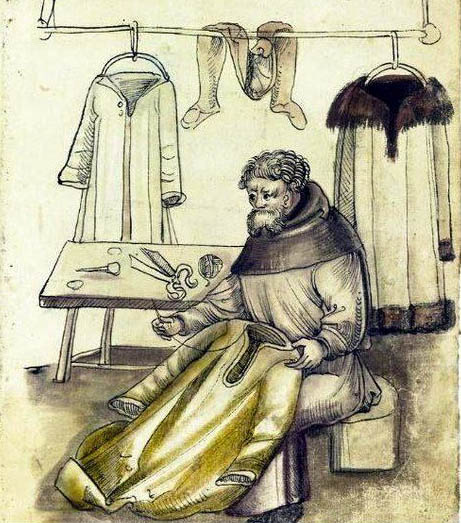 Dyers are forbidden to make up the purple of the so-called prohibited grades, that is to say in the series of great mantles, including those of self color or those where the purple alternates with dark green or yellow in half-color tint. They may dye peach tint where that color is combined with others, or common turbans of slavonian style slashed with scarlet bands. peach-colored purple and fine dresses of two palms length must be declared to the eparch and also the cloaks worth more than ten nomismata, even if of divers colors.
Dyers are forbidden to make up the purple of the so-called prohibited grades, that is to say in the series of great mantles, including those of self color or those where the purple alternates with dark green or yellow in half-color tint. They may dye peach tint where that color is combined with others, or common turbans of slavonian style slashed with scarlet bands. peach-colored purple and fine dresses of two palms length must be declared to the eparch and also the cloaks worth more than ten nomismata, even if of divers colors.
Anyone who has purchased garments made outside the city and delivers them to the Imperial store shall be flogged and shaved.
Anyone wishing to open a workshop must, if he is a freeman, be guaranteed by five persons. If he is a slave his master must be surety for him; providing him also with adequate means. In both cases the guarantors will be subject to the same liabilities as the person for whom they stand surety. And he shall pay an entrance fee of three nomismata.

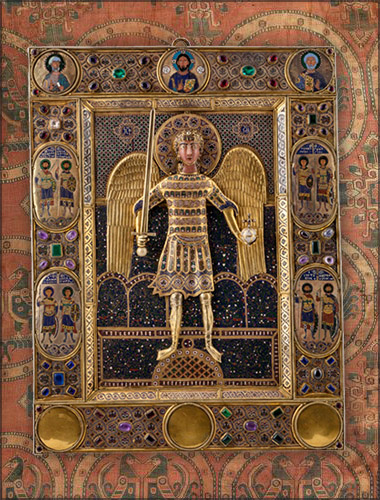


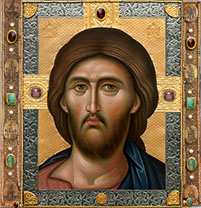 click here for icons of christ
click here for icons of christ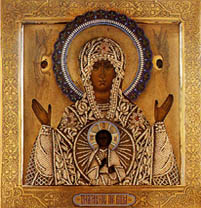 click here for icons of the theotokos
click here for icons of the theotokos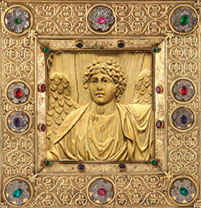 click here for icons of angels
click here for icons of angels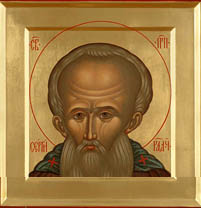 click here for icons of saints
click here for icons of saints








